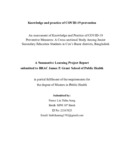Knowledge and practice of COVID-19 prevention
Abstract
Introduction: After reopening of schools and religious educational places, these gathering
places become potential places for the outbreak and transmission of COVID-19 infection. The
intervention like BRAC CST pe rojects, recruitment of the change agents among the vulnerable
people and dissemination of COVID-19 information can enhance the public awareness and
application of proper preventive methods among the secondary school students. The ultimate
aim of this study is to assess the knowledge and practice of COVID-19 prevention among the
grades 6 and 7 schools and equivalent Grades Level of Students from Madrasas in Cox’s Bazar
district, Bangladesh.
Methodology: The primary data set of cross-sectional study using self-administered
questionnaire was exploited in this study which was conducted between the end of 2022 and
early 2023 on the grades 6 and 7 students of schools and equivalent grades level of students from
madrasas in Cox’s Bazar district, Bangladesh.
Results: Among 1223 students, 75.31% of the students had adequate knowledge (71.57% from
class 6 and 79.19% from class 7). There was a statistically significant association between the
knowledge level of students in both classes and their location (p<0.05), type of institutions in
class 6 (p<0.05) and gender in only class 7 (p<0.05). The logistic regression showed that the
students from Pekua upazila had lesser odds of having adequate knowledge (AOR: 0.39, 95% CI:
0.28-0.53, p<0.05). In addition, the female students had higher odds of having adequate
knowledge (AOR: 1.49, 95% CI: 1.13-1.96, p<0.05). Moreover, the students from class 7 of both
institutions had higher odds of having adequate knowledge (AOR: 1.69, 95% CI: 1.28-2.24,
p<0.001). Based on practice level, 87.82% of students had adequate practice (86.45% from class
6 and 88.95% from class 7). In class 6, there was a statistically significant association between
practice level of students and their location (p<0.05) and only gender from class 7 (p<0.05).
There was no statistically association between adequate practice of students and their
socio-demographic characteristic while we calculated the logistic regression.
Conclusion: This study illustrated that most of the students from class 6 and 7 had adequate
knowledge and adequate practice on COVID-19 prevention. The health information session
about COVID-19 prevention should more focus in the rural area.

